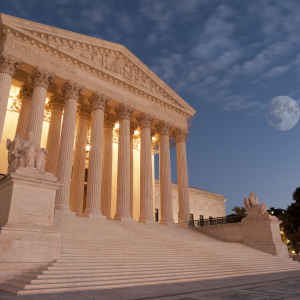In today’s mobile world, millions of Americans work or own small businesses outside the state in which they live. Unfortunately, state income tax systems penalize them by systematically discriminating against interstate income. On November 12, the Supreme Court will hear a case in which Maryland, with support from the Obama administration, is asking for even greater latitude to discriminate. If the Court rules in Maryland’s favor, it will pave the way for states to put heavier tax penalties on Americans who earn income across state lines, disrupting the free working of the open national economy on which our prosperity depends.
State tax systems discriminate against interstate income by taking two neutral tax policies and combining them in a self-contradictory way. It would be neutral for a state to tax its residents uniformly on all of their incomes, whether earned inside or outside the state. It would also be neutral to uniformly tax all income earned inside the state, whether by residents or nonresidents. And, it would be neutral to impose one uniform tax on residents’ income, both in-state and out-of-state, and another uniform tax on income earned inside the state, both by residents and nonresidents. Under that approach, of course, income earned by residents inside the state would be subject to both taxes.
But, states don’t do any of those things. Instead, each state taxes residents’ out-of-state income and also taxes nonresidents’ in-state income while taxing residents’ in-state income only once. That inconsistent approach discriminates against taxpayers who earn income across state lines.
The silver lining is that most states provide some limited relief from this discrimination by giving residents a full credit for taxes they paid to other states in which they earned income. In a state with a 5 percent tax, for example, a resident who earned income elsewhere pays no tax at home if the other state taxed the income at 5 percent or more. If the other state taxed the income at a rate below 5 percent, the resident pays the difference.
The credits are not enough to eliminate all of the discrimination – that would require an outright exemption for residents’ out-of-state income. Still, the credits provide significant relief. Without them, states’ discriminatory systems would hammer interstate income. Unfortunately, that bleak outcome could soon move closer to reality.
Although most states provide this kind of credit, the Supreme Court has never said whether the Constitution requires them to do so. Taking advantage of the Court’s silence, Maryland has charted a different course from the rest of the country, giving its residents only a partial credit for taxes paid to other states. Depending on which county they live in, Marylanders must pay a minimum 1.25 to 3.2 percent tax on their out-of-state income, no matter how heavily the other state taxed the income.
Last year, Maryland’s highest court sensibly ruled that this stingy credit unconstitutionally discriminated against interstate income. But, its decision is not going to be the last word. The Supreme Court has agreed to hear Maryland’s challenge to the ruling and the Obama administration has entered the case on the state’s side.
The stakes are high. Maryland and the administration claim that states don’t have to give any credits at all for taxes paid to other states. The way they see it, even Maryland’s partial credit is a favor that the state legislature can take away any time it pleases.
I and seven other scholars have urged the Court to reject this dangerous position. We point out that even a full credit does not eliminate the discrimination caused by states’ self-contradictory taxation of residents’ incomes and income earned inside the state. Realistically, the Court is not going to strike down the numerous and longstanding state tax systems that offer full credits, despite their lingering discrimination. But, the Court must draw the line at Maryland’s unusually stingy credit.
If the Court goes the other way, it will give states around the country a green light to follow Maryland’s lead and start chipping away at their credits, amplifying the tax penalties on those who work and own small businesses across state lines. Each state will ask whether it should keep giving tax relief to residents who contribute to other states’ economies.
That thinking runs counter to the Constitution’s vision. All 50 states are part of one nation, whose economy is strengthened when Americans enjoy unfettered freedom to work and do business across state lines. The Supreme Court should not allow state parochialism to undermine free interstate trade.

